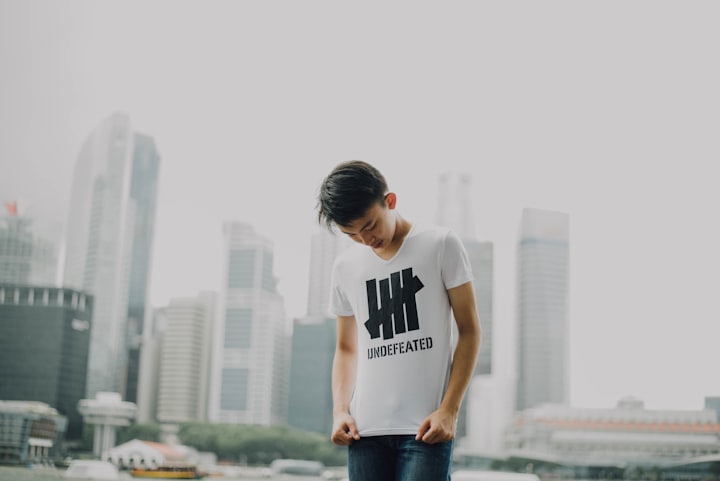How to Develop Your Personal Online Brand
...Even if you value your privacy

There was an unnerving TV drama in the 1960s called The Prisoner about a British spy held against his will in a surreal and ominous seaside village. We watched as he was doomed to live out his days in an unbearably sterile and inane countryside purgatory, half-prisoner, half-resident, wholly trapped.
He'd been stripped of his identity when he was placed in the prison-village and was simply known as ‘Number 6’. He’d live each day under this moniker for the amusement and benefit of people he didn’t even know or see.
The programme’s title sequence featured his character shouting:
“I will not make any deals with you. I’ve resigned. I will not be pushed, filed, stamped, indexed, briefed, debriefed or numbered! My life is my own!”
Why's this relevant? Well...
This is what it's like being anonymous online.
Yup, that’s right, I compared a 1960’s television classic to today’s internet. Talk about your convoluted segue.
So to be clear from now on, in this article I'm going to explain why the key to building an online brand is being the real you.
Calling yourself number6, bearkilla44 or checkoutmyswag69 is doing you a huge disservice.
How? I know the word “branding” sounds boring but anonymity means you're lacking in authenticity, connection and ultimately a slice of happiness.
Let's find out what it means to create a brand YOU.
What is a personal online brand?
"Brand" is a super pretentious, corporate style buzzword people use to mean the identity that promotes a product or content.
Unless you're Nike or Facebook, you'll want to promote your content as a real person – meaning no anonymous avatars and monikers, rather your actual face and name.
This radical concept in these times, I know. It also feels a little alarming.
I’ve been anonymous online for years; anonymous blogs, writing and social media accounts. I was paranoid about privacy and it took me years to realise I needed to be a relatable human if I ever wanted to be authentic in my writing and videos.
How could I expect to connect with followers, fans and customers if I wasn't willing to reveal anything about myself?
Connection is a reciprocal process, if you want it, you have to be vulnerable and open up.
Becoming ‘Brand YOU’
A writer needs to open up. Period. If I posted on Vocal using a cartoon avatar and a made-up name it would stain my words with inauthenticity, it would feel as if I had something to hide.
As the adage goes, “A cartoon avatar and made up name only go so far.”
So I acquiesced and started over. I decided to become myself. I set up Medium, Vocal and Twitter accounts all using my real face and name. I was slowly revealing myself to the online world, tentatively braving exposure.
Then I began a podcast. Using my name. Then a vlog. Now there really is no place to hide. In two years I’d gone from total anonymity to bearing my soul to the digital masses.
The benefits of being yourself online
Personally, there have been two pillars of progress on this front:
- I've made some decent money from my online content. If you don't think this is correlated to revealing my name and face, it's worth noting I made zero money from content when I was anonymous.
- I feel more authentic and I'm learning about myself as I create. I guess it's a form of therapy.
The business reason for being an online brand
Being real online means wherever you go, you become an advert for your content. You are the walking, talking ‘Brand You’.
You cross-pollinate small successes on one platform to another platform without concerted effort, but just by being you.
Here’s a real example of cross-pollination.
I wrote an article about Tony Robbins coaching on a platform that received tens of thousands of views and made me $4,000. In the article, I posted a link to the YouTube video I made about the coaching, which in turn netted me more YouTube followers, which then watched and read my other content.
Badda-bing-badda-boom. Cross pollination.
It's also important to note I was very vulnerable in that content. I shared struggles, financial concerns and so on. I was as real and transparent as one could be about the journey.
The point here is I couldn't have made that content without showing who I was.
And the knock-on effect of being ‘Brand Me’ continued.
My other articles on Vocal and Medium started getting views. My Twitter account got followers too. And I can only assume that out of the tens of thousands of reads, some downloaded my podcast out of curiosity. I even had one person ask me where I was doing stand up next so they could see me tell bad jokes in person.
That is what being a real person online means.
People will follow you across platforms and engage with everything you’re doing because it is real. It’s part of creating what Kevin Kelly calls “1000 true fans.”
Side benefits of authenticity
The real had been screaming to express itself. I was inspired by James Altucher who was honest to the bone in his writing; he documented a breakdown, his relationship and money woes, throwing away all his possessions and finding himself again, all on the page.
His bio reads “For some reason, I’ve turned myself inside out and all my guts have spilled onto my blog.” He’s not lying.
The moment I started embracing being myself online is the moment I began feeling an odd sense of freedom. I started remembering who I am.
Do not underestimate the benefits of being the real you in a space you’ve carved out for yourself.
Ok but what about the privacy issues? You promised to talk about the privacy issues!
Privacy is very important. I'm tinfoil hat levels of concerned about privacy. I still refuse to have a Google phone or an Alexa in my house. I won’t use the Amazon Ring doorbell and I give Facebook nothing but false information.
I’ve been squawking about the vulnerability data way before Cambridge Analytical or Edward Snowden.
So can you be authentic online and have privacy?
Yes, is the short answer.
I open up about me, but I don’t open up about unnecessary and boring details about my identity. You have to be sensible. Here are some things to do to ensure your life stays private:
- Ensure you don't reveal any information that pinpoints your workplace, home, my car reg and so forth.
- Have an abbreviated name on LinkedIn – the network shows where you work and it's best to limit who can google that information.
- I do not use a real identity on Amazon, Facebook, Google or any of the other “big five” (I acquiesce with Apple who, unlike the rest, do not have a business model that is solely based on data collection).
- Do not be "friends" with colleagues from work on any networks other than LinkedIn to avoid people piecing together who you know and where you work.
- And here’s a big one… A confession. Jamie Jackson isn’t my real name — though it’s very close — it is a stage name for comedy and writing purposes. People have been using pen names for centuries.
Good online privacy means setting boundaries and sticking to them. You're trying to do the exact opposite of what we’re attempting with online branding.
With an online personal brand, we want to cross-pollinate platforms, with privacy, we want to ensure there is zero cross-pollination with your life.
“But can’t someone look at all your content and work out some facts?”
Good question and the answer is probably, yes. But if someone really wants to stalk you, or find you, they can, whether you are a real person online or not. It's about not making it obvious. You don’t need to surrender your entire life to have an authentic online presence.
Conclusions
Revealing my identity online was one of the best decisions I’ve ever made.
My writing serves me better, it is therapeutic, and people have started to connect with what I’m saying. That feels amazing.
Last year, I went through a 10-week course with a mindset coach and one of the things to come out of it was that I loved connection. If I'm able to stick a flag up and say “This is how I’m feeling” and other people respond with “Me too” that is just fantastic.
It’s one of the greatest things about the internet. We are no longer alone.
Please do consider becoming ‘Brand YOU’. Don’t do it for the money or fame (though these things might come with it), do it for the delight of reaching out to others and supporting others in this up and down ride we call life.
Peace out.
About the Creator
Jamie Jackson
Between two skies and towards the night.






Comments
There are no comments for this story
Be the first to respond and start the conversation.